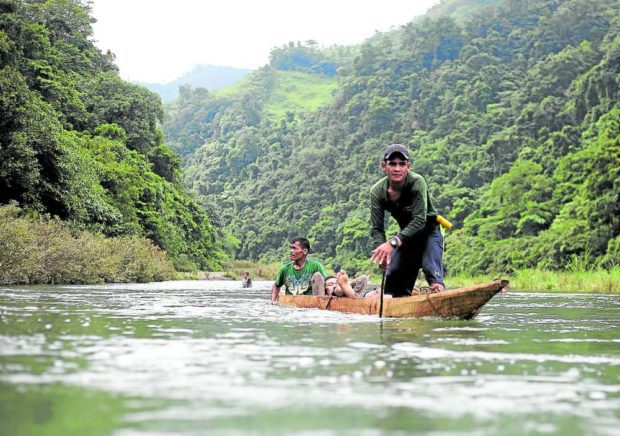Quezon-Manila protest march set vs Kaliwa Dam in Sierra Madre

HOME OF THE TRIBE A group of Dumagat crosses the Kaliwa-Agos River in Infanta, Quezon province, in a photo taken in August 2019. Indigenous peoples in the Sierra Madre mountains are opposing the construction of the Kaliwa Dam in their midst. (File photo by RICHARD A. REYES / Philippine Daily Inquirer)
LUCENA CITY, Quezon, Philippines — Indigenous peoples groups in the Sierra Madre and representatives of different organizations supporting them will stage a nine-day 148-kilometer protest march from General Nakar town in Quezon province to Metro Manila starting on Feb. 15 in a bid to stop the construction of the controversial Kaliwa Dam.
As of Sunday, the march, dubbed “Alay Lakad Laban sa Kaliwa Dam,” would be participated in by more than 300 tribesmen, church leaders and workers, environmentalists, farmers, and residents from northern Quezon, according to the “Stop Kaliwa Dam” group, a network of local and international organizations, institutions, and multisectoral groups that are opposing the project.
In 2009, tribesmen, farmers, and religious and environmentalist groups staged the General Nakar to Malacañang protest march to dramatize their opposition to the Laiban Dam project in the Sierra Madre. The government was forced to abandon the project the next year.
Dumagat leader Marcelino Tena, in a social media post on Sunday, appealed to police and military officials to help ensure the safety of the marchers along the route, stressing that their activity is planned to be done peacefully.
“We do not intend to start trouble,” stressed Tena.
Article continues after this advertisementOther ways
Ramcy Astoveza, tribal chieftain of the Agta tribe that has ancestral land claim in the Sierra Madre, said in a phone interview on Sunday that the government has many alternatives to solve the water crisis in Metro Manila without “sacrificing our lives and security in our ancestral domain.”
Article continues after this advertisementEarly this month, the Metropolitan Waterworks and Sewerage System (MWSS) announced that the P12.2-billion, Chinese-funded Kaliwa Dam could now be completed by 2026 and start operation the following year.
The MWSS added the controversial project would “no longer be derailed” after spending eight years just to secure permits for its construction.
The construction of the dam, which intends to solve the looming water crisis in Metro Manila, was awarded to the Chinese company, China Energy, under an official development assistance agreement between Manila and Beijing.
The project, however, will submerge parts of the Sierra Madre in Tanay town, Rizal province, and General Nakar and Infanta towns in Quezon province.
The dam construction is expected to flood around 9,700 hectares of watershed area and affect 1,465 families, according to studies by the Save Sierra Madre Network Alliance.
The project will also include the Upper Marikina Watershed and the Kaliwa Watershed Forest Reserve, a conservation site in the Sierra Madre Biodiversity Corridor, a protected area under Presidential Proclamation No. 1636.
‘Slow death’
Astoveza said stakeholders, particularly the indigenous peoples’ communities in the Sierra Madre mountain ranges, were racing against time to stop the dam project.
“The MWSS is now starting the construction. It signals the slow death of the Sierra Madre and all who depend on the sacred mountain,” he said.
The MWSS and the National Commission on Indigenous Peoples (NCIP) said they had obtained the free, prior and informed consent of the 46 tribal communities to be affected by the project.
Both Astoveza and Tena refuted the claim of the MWSS and NCIP.